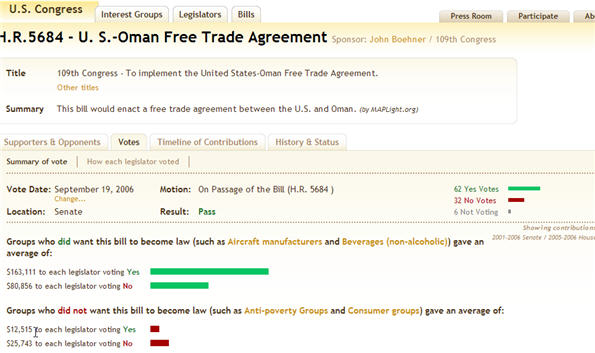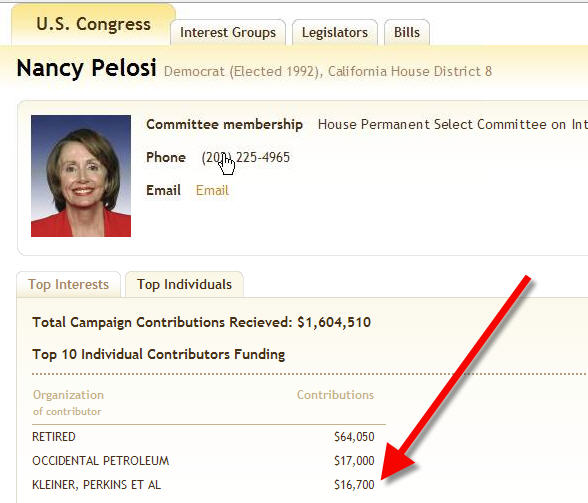 Maplight.org, is a Berkeley, Calif.’ company that opens the kimono on politicians, their financial ties with interest groups, and how they vote on bills in U.S Congress or state senate.
Maplight.org, is a Berkeley, Calif.’ company that opens the kimono on politicians, their financial ties with interest groups, and how they vote on bills in U.S Congress or state senate.
The site creates an extraordinary transparency not seen anywhere else. For example, it shows in great detail that several large corporations donated money to Rep. Kevin Brady around the time of his vote of a free-trade agreement with Oman. On the day before the vote, someone associated with Lyondell Chemical gave him $1,000. And, yes, you guessed it, he voted for the bill. Lyondell, Coca Cola and Dow Chemical are all shown as supporters of the bill. On average, supporters gave twice as much money to politicians who supported the bill than they did to those who voted against it.
Now, this doesn’t necessarily prove that the contributions were the sole reason for Brady’s support for the bill (the politician may have been leaning toward voting for the bill anyway), but this is a great resource for those who want to document coincidental ties over time, for reporters or other sleuths acting as watchdogs.

Here’s a useful video tour of how it works.
The power comes mainly from Maplight’s use of web and database technology to connect the dots between data sources that already exist. For example, you can already get a list of which individuals donate to which politicians, the organizations they are affiliated with, and the voting record of politicians on bills (this all comes from federal reports about donations to US Congress, Opensecrets.org, and so on). But Maplight has combined these information streams (political donations and votes) into one database, so you can suddenly see which interests are affecting, or trying to affect, which bills. Until now, no one has done this in a way to make it all researchable. As a reporter who once combed for hours through campaign contribution documents, I know how useful this.
Another cool thing about Maplight.org is that it lets users customize it for their own use and then share it with others on their own Web pages. It solicits user input to make the site even more useful. For example, if you find an article that documents the support of a bill by a particular interest group, you can input that data, providing the source, and Maplight incorporates it. If you customize a site and add your own data, Maplight lets others find your work by providing a unique URL for your work, but also provides a disclaimer that not all of the data comes from Maplight. It’s pretty spiff in a tech sense: It’s developed on Drupal, has an API, and publishes the source code openly — so third-party programmers can play with the data in raw form, draw data into their own widgets, and build other applications around it.
So what’s driving founder Dan Newman, given that this company is a non-profit? It can’t be money. His answer: Politicians tend to be chosen according to how effective they can raise funds, which means many problems — whether healthcare, technology policy, or global warming — aren’t getting solved. “When I tried to explain campaign contributions are causing this, I was waving my hands too much,” he said. “We created Maplight to show people specifically how issues they care about are connected with campaign dollars.”
There are lots of other features. You can select individual politicians, and see what money is going to them, categorized not merely by company, but by interest group industry category (oil, transportation, etc). That’s because Maplight tags each donation according to which industry it comes from, not merely the company. Maplight tracks each congressional bill, and tracks which organizations have opposed or supported it. It also lets you sort by interest group, and shows which bills they’ve donated money to.
 The company has much more in the works too. With elections coming up soon, Maplight is a tool worth getting familiar with. There’s a presidential widget (see left). We may even use for reporting on VentureBeat. See the partial profile below for Pelosi, which shows how Silicon Valley venture capital firm Kleiner Perkins is listed as her third largest donor.
The company has much more in the works too. With elections coming up soon, Maplight is a tool worth getting familiar with. There’s a presidential widget (see left). We may even use for reporting on VentureBeat. See the partial profile below for Pelosi, which shows how Silicon Valley venture capital firm Kleiner Perkins is listed as her third largest donor.

VentureBeat's mission is to be a digital town square for technical decision-makers to gain knowledge about transformative enterprise technology and transact. Learn More
